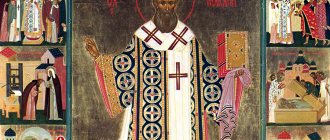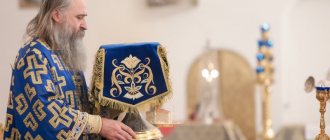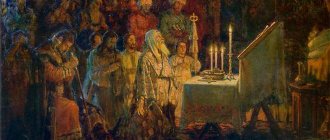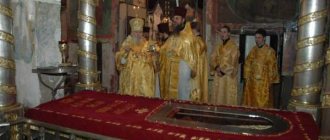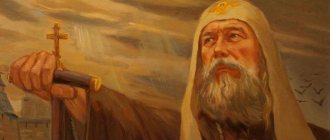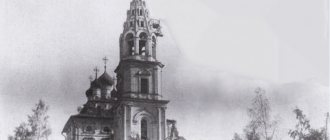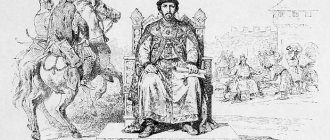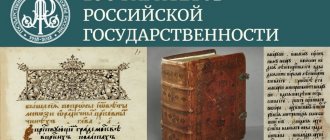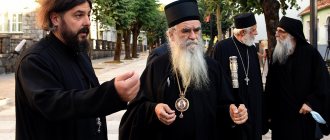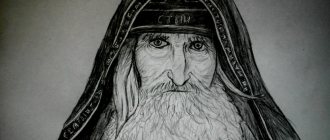Saint Macarius of Nevsky is an amazing archpastor of the Russian Church, an outstanding personality of Russia.
The future Saint Macarius Nevsky was born in 1835 in the Vladimir province, into a poor large family of the priest of the rural church Andrei Parvitsky (the surname “Nevsky” was given to him much later, in the seminary), and was baptized by Michael. After some time, the family moved to Siberia - so the youth Mikhail went to study in Tobolsk: first to the theological school, and then to the local seminary, which he graduated from in 1854. He could be proud of his success, and no one would be surprised if the young man continued his studies at the Theological Academy, but he did not want such a “solution” for his own life.
Enlightener Macarius
His heart had long been burning with the dream of missionary activity. Since 1855, Mikhail Nevsky was included in the Altai spiritual mission. In 1861 he was tonsured a monk with the name Macarius. His thirty years of activity in Altai (from 1855 to 1884, when Archimandrite Macarius was consecrated Bishop of Biysk and he himself headed the Altai mission) is an example of high Christian asceticism: Father Macarius never tired of preaching the Word of God in the farthest corners of this mountainous country, not being afraid to speak out in front of aggressive, inveterate pagans, whom he knew how to convince of his own rightness. He was known everywhere in Altai and loved.
The saint himself, speaking at the naming of him Bishop of Biysk, said:
“For my inexperience, thirty years of life in Altai was the kind of missionary academy that was once supposed to be opened in the center of Russia; only there they wanted to teach missionary work from books, but here life was the teacher.”
He cared a lot about proper education, about the organization of schools, the graduates of which, from foreigners, could bring the light of truth to their native places, about the translation of the Holy Scriptures and liturgical texts into the Altai language...
In 1891, Bishop Macarius had to leave Altai, which had become his home, and he was assigned to be the Bishop of Tomsk and Semipalatinsk with a stay in the “cathedral” city of Tomsk. Bishop of Tomsk and Sempalatinsk (1891), Bishop of Tomsk and Barnaul (1895), Archbishop of Tomsk and Altai (1908) - the titles changed, but not the “content”: and in the new place, Bishop Macarius continued his tireless work in the spiritual field, paying special attention for his favorite educational work. He arranged for a permanent “place of residence” in Tomsk Seminary, helped a lot to the women’s diocesan school... He even managed to send diocesan women on an educational trip around European Russia! Broad charity and education are the main areas of the archpastor’s efforts. Plus “fatherly, selfless love” for people. It must be admitted that the saint thought quite strategically.
Mikhail Andreevich was born on October 1, 1835 in the village of Shapkino, Kovrov district (now Savinsky district, Ivanovo region), in a large family (he was the sixth child) of Andrei Parvitsky, a cleric of the rural Church of the Nativity of the Blessed Virgin Mary, who later moved with his family to Siberia.
He graduated from the Tobolsk Theological School and entered the Tobolsk Theological Seminary. Mikhail was given the surname Nevsky at the seminary - at that time seminarians often changed their surnames. In 1854 he graduated from the Tobolsk Theological Seminary. He refused to enter the Theological Academy (which he could count on as the second best performing seminarian in his year) in order to engage in missionary activity (for more than 35 years) in Altai. On February 22 (March 6), 1855, he entered service in the Altai Spiritual Mission with the rank of teacher and missionary employee. In 1855-1857 he served as a psalm-reader in the Ulalinskaya church. According to his own recollections, “he performed the duties of a reader, accompanied missionaries on their travels, studied at school, went from house to house to teach prayers to converts, cared for the sick, and did not disdain hard physical labor: he dug ridges in vegetable gardens, coated the walls of the wretched dwellings of the mission’s inhabitants with clay, in a word, he went everywhere where his labors were needed for the mission.” In addition, for two years he studied the Altai language and translated prayers and services into it together with the translator Mikhail Chevalkov. At the same time, Hieromonk Macarius, “in order to find and introduce some new term, often deliberately went for several weeks and even months to the remote backwaters of Altai and only through long and many conversations with various foreigners, after the conviction that to designate a well-known Christian the concept is suitable and for all foreigners it is clear that this and not another expression led to the acceptance and use of a well-known term.” On January 25 (February 6), 1857, he was tonsured into the ryassophore, served as a catechist in Chulyshman, and was a teacher of church singing in the missionary schools of Chemal and Ulala. On March 11 (23), 1861, he was tonsured a monk. From March 17 (29), 1861 - hierodeacon, from March 19 of the same year - hieromonk (he was ordained in the camp church of the Altai Mission). Along with missionary work, he was engaged in medical activities; there are known cases of his healing seriously ill Altai residents. From November 14 (26), 1864 - abbot of the Chulyshman Annunciation Missionary Monastery. This is how he recalled the peculiarities of a missionary’s work: “Missionary service, like apostolic service, is most of all a series of sorrows, illnesses and labors... We are not talking about the difficulties of missionary travel, which are rarely carried out in a carriage, never in a carriage, but often on foot, on skis, often on horseback, on a boat, in the rain, sometimes in a snowstorm, all this is illness and labor for the body. But there is great suffering—suffering of the soul. A missionary is a sufferer, he suffers in soul at the beginning of his ministry from the environment in which he finds himself, there is no family of his own, no native society, no living environment familiar to him.” Metropolitan Macarius, without exaggeration, belonged to the brilliant galaxy of Orthodox missionaries who, at the end of the 19th and beginning of the 20th centuries, completed the process of spreading Christianity over vast areas of Russia, which began back in 988. Metropolitan Macarius Nevsky
The fate of this generation of outstanding missionaries was tragic: many of them died in Stalin’s camps, and their work fell into oblivion.
Meanwhile, the works of Macarius, his contemporaries and associates were important not only for the Orthodox Church, but also for secular scientific disciplines: history, linguistics, ethnography, etc. On the initiative of Macarius, starting in the 60s, missionary departments began to open in theological seminaries and academies, on the basis of which later educational institutions of a new type appeared - missionary schools. In 1864 and in 1867-1868 he was in St. Petersburg, where he was engaged in printing the first “Altai primer” he compiled and Orthodox books in the Altai language. Among these books were “The Liturgy of St. John Chrysostom”, “The Sacred History of the New Testament”, “Catechetical Teachings for Those Preparing for Holy Baptism” and a number of others. These were the first books published in the Altai language. To this day, these works are among the most important in the training of specialists in comparative linguistics, ethnography and oriental studies. The publication of “Grammar of the Altai Language” completed the formation of writing for the unwritten Finno-Ugric and Turkic languages based on the Russian alphabet. What is puzzling, however, is the fact that in bibliographic reviews of the recent past either the name of the author was not indicated, or “M. Nevsky”, which made it difficult to use this book. In 1868-1869, together with Kazan professor Nikolai Ivanovich Ilminsky, he prepared for publication the first grammar of the Altai language compiled by Altai missionaries. He was elected a member of the Council of the Translation Brotherhood of St. Guria (Kazan). During his stay in Kazan, he organized a divine service in the Tatar language, creating a choir of baptized Tatars and creating church chants for it based on the Altai ones. Returning to Altai, he organized a school in Cheposh for seventy people with a dormitory for training teachers for other schools, the first graduation of which took place in 1872. From July 29 (August 10), 1871 - abbot. Since 1875 - head of the Central Missionary School in the village of Ulaly, which trained teachers, translators, clergy, and catechists. From March 13, 1875 - assistant to the head of the Altai spiritual mission. Since 1876, at the same time a member of the commission for the consideration of manuscripts intended for publication in the Altai language. From June 29 (July 11), 1883 - archimandrite. From December 29, 1883, he was the head of the Altai spiritual mission
(he remained until 1891, but in subsequent years he exercised trusteeship over the affairs of the mission). For his many years of missionary work, he was called the “Apostle of Altai.” He played a significant role in the formation and development of the Biysk Catechetical School, in which representatives of various nationalities of both Altai and the Tomsk diocese as a whole were educated: Altaians, Teleuts, Shors, Abinets, Maturians, Sagais, Kirghiz, Ostyaks from the Narym region. He was awarded the highest gratitude from Nicholas II in the matter of church and school construction in Siberia. Under the leadership of Macarius Nevsky there was an orphanage and a house of hard work in the Predtechensky Convent of Tomsk.
$IMAGE3$ Monument to Metropolitan Macarius in the city of Biysk at the Bishop's Compound. Sculptor Sergey Isakov. Opened in 2009
He was involved in the fight against the Old Believers: under him, the anti-schismatic brotherhood of St. Demetrius of Rostov was established in Biysk in 1884. The conflict between Bishop Macarius and the Old Believers was acute: the Old Believers were held responsible for the fire on May 22 (June 3), 1886, in the bishop's house, as a result of which the house with a valuable library and mission archive and the Catechetical School burned down. From February 12 (24), 1884 - Bishop of Biysk, vicar of the Tomsk diocese.
$IMAGE2$ Bishop of Biysk Makariy
From May 26 (June 7), 1891 - Bishop of Tomsk and Semipalatinsk.
Since 1895 - Bishop of Tomsk and Barnaul. On May 6 (19), 1906, he was elevated to the rank of archbishop. Since October 1908 - Archbishop of Tomsk and Altai. He was the chairman of the Tomsk committee of the Orthodox Missionary Society. He opened a library in the bishop's house, where classes were conducted and lectures were given on theology, history, and geography. Under him, new subjects were introduced into the curriculum of Tomsk religious educational institutions - cosmography, hygiene, natural history, chemistry, music, singing, drawing. A new building of the Tomsk Diocesan School was built, the premises of the men's theological school were expanded, the Tomsk Theological Seminary was located in a large and comfortable building, and a church teachers' school was opened. Vladyka was engaged in charity work; for the unemployed and orphans of the clergy, who had previously huddled in damp and cold rooms, he founded the Tomsk Society for the Care of the Poor and Homeless (“Beekeeper”). On his initiative, a city shelter for homeless and poor people was opened in Tomsk. His activities aroused hatred among local sectarians and exiled revolutionaries. They tried to kill him several times, and on May 22 (June 3), 1886, the bishop's house was set on fire, the library, the mission archive, and the building of the Catechetical School were burned, but Bishop Macarius managed to escape. During the revolution of 1905-1907, he showed himself as a monarchist and guardian of traditions, contributed to monarchist organizations and was the honorary chairman of the Tomsk provincial department of the Union of the Russian People. From November 25 (December 8), 1912 to March 1917 - Metropolitan of Moscow and Kolomna
, Holy Archimandrite of the Trinity-Sergius Lavra, Chairman of the Orthodox Missionary Society;
member of the Holy Synod. Arrived in Moscow on December 22 of the same year (old style); On December 23, he solemnly entered into the administration of the Moscow Metropolis. With the highest rescript of May 25 (June 7), 1913 (the day of the Romanov celebrations in Moscow), he was granted panagia. When Emperor Nicholas II arrived in Moscow for the celebrations, he met him and his family at the Trinity-Sergius Lavra on May 24, 1913, upon entering the Kremlin on the same day, and upon entering the Assumption Cathedral on May 25, making short welcoming speeches[5]. He introduced nationwide singing in Moscow churches, was engaged in catechesis of the flock, convincing Moscow pastors to follow his example. However, despite his previous missionary merits, he did not enjoy great authority among the clergy of Moscow due to his advanced age, extremely conservative views, as well as rumors circulating at that time that he owed his appointment to the Moscow See to Grigory Rasputin (Metropolitan of this kind of speculation thought it was fiction). Protopresbyter Georgy Shavelsky, who was a member of the Synod in the pre-revolutionary years, while in exile, gave him the following description: “He was a small, handsome old man, whose appearance resembled the famous Metropolitan Philaret (Drozdov), and in his abilities diametrically opposed to him. He was completely incapable of either managing the responsible Moscow diocese or participating in the resolution of synodal affairs. The diocese was ruled by others - whoever wanted and who knew how to gain his trust. The Metropolitan often fell asleep during the reports of his subordinates, and the speaker, not daring to disturb the peaceful sleep of the Bishop, left him with nothing. At the Synod, in his presence, his proposals and petitions were repeatedly rejected one after another, and he silently accepted this embarrassment. Tsarskoe Selo looked at Metropolitan Macarius as a righteous man. And those who knew Metropolitan Macarius closely strongly asserted that he was on great friendship with Grishka (Rasputin).” By resolution of the Holy Synod of March 20 (April 2), 1917, No. 1661, he was dismissed from the Moscow see, but remained in the rank of member of the Holy Synod (he was not called for the next, summer session of 1917). He protested against his dismissal, considering it uncanonical, committed under pressure from the Chief Prosecutor of the Synod (as part of the Provisional Government) Vladimir Lvov. However, Metropolitan Macarius was not reinstated at the see, although he announced a ban on members of the diocesan congress and even the entire Moscow clergy from serving in the priesthood (no one obeyed this ban). In 1917, he lived for some time in retirement in the Zosimova Smolensk Hermitage, and then was transported to the Nikolo-Ugreshsky Monastery near Moscow. In June 1917, the diocesan congress of clergy and laity elected Archbishop Tikhon to the Moscow see, who in November of the same year became Patriarch of Moscow and All Rus'. He turned to the Local Council of 1917-1918 with a request to consider his case - at the council he was rehabilitated, but this was not officially reported. In addition, the public rehabilitation of a convinced monarchist and alleged “Rasputinist” was politically impossible at that time. In 1918, the cell of Metropolitan Macarius in the Nikolo-Ugreshsky Monastery was searched twice by representatives of the Soviet government (July 20 and October 20), and on October 3 it was attacked by armed bandits looking for money, which the elderly bishop did not have. According to the memoirs of Abbess Juliania (Nevakovich), then the eldest sister of the Cathedral of Christ the Savior: “In the winter of 1919, in the Cathedral of Christ the Savior, a young man approached the table of the temple sisters and asked to help Metropolitan Macarius. From his words we learned that the metropolitan, who was allowed, I don’t know by whom, to live in the former bishop’s house of the Nikolo-Ugreshi monastery, lived, paralyzed, in unheated rooms, with two cell attendants devoted to him, one of whom was a hieromonk. All three of them were not entitled to food cards and were starving. The monastery was turned into a children's rest home. The always energetic sacristan of the Cathedral of Christ the Savior, Fr. Alexander Khotovitsky immediately arranged for the Metropolitan to collect food, that is, black bread and millet - there was nothing else at that time. But then the question arose: how to deliver these products? You had to go there on foot, there were almost no trains, and it was dangerous to travel on them: you could be mistaken for a so-called bagman and arrested. The monastery was also far from the railway. But young people from the subdeacons were found, and they began to take turns walking with the young people of the community, Fr. Alexey Mechev. They all returned delighted with the Metropolitan, whom they carried in a chair. The spirit of the metropolitan is strong. Accustomed to leading young people in Tomsk, from where many archpastors and shepherds came from for Siberia, Vladyka had a special gift for attracting young people to himself.” Metropolitan of Altai - August 19, 1920 - March 1, 1926 On
August 19, 1920, the Holy Synod issued a ruling on the lifelong existence of retired Metropolitan Macarius as Metropolitan of Altai, which Patriarch Tikhon notified him of in a personal letter. He directed the Altai flock from the Nikolo-Ugreshsky Monastery, on Sundays he served in the monastery’s cathedral and delivered sermons. In 1920 he was partially paralyzed. He hosted spiritual children (in particular, students of the Institute of Noble Maidens in the Nikolo-Ugreshsky Monastery), as well as famous church figures. Patriarch Tikhon visited him several times; after being confirmed as Patriarchal Locum Tenens in 1925, Metropolitan Peter (Polyansky) came to see him, to whom Metropolitan Macarius presented his white hood. Among other visitors were Archbishop Innokenty (Sokolov) of Biysk, Bishop Arseny (Zhadanovsky), who left memoirs about him, and priest Sergei Mechev. In 1925, after the closure of the Nikolo-Ugreshsky Monastery, he lived in the village of Kotelniki near Lyubertsy, where he died of pneumonia. He was buried in the parish cemetery of the Lyubertsy station near the altar of the cemetery church. In 1957, he was reburied in the crypt of the Assumption Cathedral of the Trinity-Sergius Lavra - in the Church of All Saints who shone in the Russian land.
Works
Conversations on Christian life and education. St. Petersburg, 1902. Education, rights and responsibilities of women. St. Petersburg, 1902. Simple speeches about the great deeds of God. Tomsk, 1900. Complete collection of preaching works (words, conversations, teachings, messages, appeals and instructions), for the entire period of his service as a bishop, 1884-1913. Sergiev Posad, 1914. Letters to my spiritual daughter. Sergiev Posad, 1915. I do not despair of God’s help: Sat. letters / Comp. G. G. Gulichkina. - M.: Sretensky Monastery Publishing House, 2008. - 472 p. — (Letters on spiritual life). — ISBN 978-5-7533-0179-6. Natives and figures of the Vladimir province
Metropolitan Macarius Nevsky at the Moscow See
At the end of 1912, Saint Macarius of Nevsky was elevated to the rank of metropolitan and appointed to the Moscow See. The elder, still vigorous and active, managed to attract to himself the souls of Muscovites who had seen everything, and managed to win the love and veneration of his new flock - just as he had previously won the love of his Altai and Siberian children.
At the same time, Metropolitan Macarius was strict towards clergy who were seen to be indifferent or neglectful of their spiritual duties. Saint Macarius himself has always been an example for the priests under him. Thus, he never spoke at the altar, while others immediately after communion began conversations “on the topic of the day.” If they approached him at that time with a question or conversation, he meekly answered: “Christ is in our midst.” And he didn’t say another word.
But 1917 was already approaching - with its unheard-of deeds that could not fit into the mind. Unheard of and ugly. One of these cases was the brutal dismissal of Metropolitan Macarius (Nevsky) of Moscow and Kolomna.
The “retirement” of the saint shocked everyone. Moreover, it was produced in the crudest form. The Chief Prosecutor of the Synod, Prince V. Lvov, literally forced him to write a petition for his retirement. Having lost his cathedra, the disgraced metropolitan wanted to settle in the Trinity-Sergius Lavra, but he was not allowed. Then he went to Zosimov’s Smolensk hermitage, but even here the bishop was not allowed to stay for long. Having identified the Nikolo-Ugreshsky Monastery as his place of residence (or rather, imprisonment), the saint was taken there by a ring road, not even allowing him to enter Moscow to say goodbye to his flock.
How do prayers to a saint help?
There is a lot of evidence that he helped those in need during his lifetime. This could manifest itself both in simple advice and in medical practice. They often turn to him today. The most popular requests concern:
- raising children;
- gifts of mind;
- strengthening faith;
- healing from illnesses and other things.
The best article for you, go to: The icon of the Holy Martyr Tatiana, how it helps, how to pray
Another good help is the letters of Macarius Nevsky to his spiritual daughter. This is a collection of essays, by re-reading which you can find the answer to the question that concerns you. They raise the most pressing questions of spiritual life. Sayings from it will help you find solace in various adversities.
Metropolitan Macarius Nevsky In the Nikolo-Ugreshsky Monastery
The “Apostle of Altai” lived in the Nikolo-Ugreshsky Monastery until 1925 - that is, until the time when it was possible to live there as a monk. Having become accustomed to incessant activity from a young age, Saint Macarius languished from forced rest. But when, three years after his removal from the see, His Holiness Patriarch Tikhon, who treated the saint with great respect, confirmed him as Metropolitan of Altai, it was already clear that this title was only recognition of the merits of one of the oldest hierarchs. The eighty-five-year-old old man could not travel to Altai. In 1920, he suffered from partial paralysis.
At Ugresh they fell in love with Bishop Macarius. And not only monks, but also children - from neighboring villages and from the colony, which for some time shared the monastery with monks. These children often came to the saint.
In the Nikolo-Ugreshsky Monastery, Saint Macarius was visited twice by representatives of the punitive authorities - they searched his modest home and still could not believe that he had neither money nor “products made of precious metals” hidden. But the Metropolitan really had none of this.
Metropolitan Macarius often had guests from Moscow: the Patriarch of Moscow and All Rus' Tikhon came to him several times for a conversation, and other hierarchs, as well as Moscow priests, visited him. One of those who participated in such a trip very accurately defined its meaning:
“It was a difficult time, we all wanted to strengthen ourselves near the lamp of Orthodoxy - Bishop Macarius, in order to stand in the truth if we had to be tested.”
Administrative and scientific activities
Metropolitan Manuel (Lemeshevsky) characterized the activities of Metropolitan Macarius as rector of the St. Petersburg Theological Academy:
Through a series of prudent measures, he established a definite and unchanging order in student life. The students were not burdened by the strictness of the rules; they loved their boss. According to the students themselves, “a more direct, honest and frank teacher-teacher could not be imagined.” No flattery, no servility, beyond a direct relation to the matter, was available to him. The importance of the Reverend in the education of students. Macarius gave importance to church services. He took every measure to make the service in the academic church as solemn as possible, and whenever possible he himself tried to participate in the service.
Bishop Macarius was known as a capable and energetic administrator. At the St. Petersburg Theological Academy, he paid great attention to improving the financial situation of teachers and students and equipping the academic library. While managing the Tambov diocese, he was actively involved in streamlining office work, which had been in a neglected state before him. In the Kharkov diocese, he was the executive editor of the Christian Reading magazine; on his initiative, a church library was created, which could be used by both clergy and secular persons; With the active participation of the bishop, a monastery was founded in the name of the Holy Great Martyr Demetrius of Thessalonica in the village of Ryasnoye. The number of public schools in the diocese during his administration increased fourfold (in total, by 1869 there were 405 schools in operation). The Bishop sought to increase both the educational level of the Kharkov clergy and the religious piety of his flock - he restored several previously existing religious processions in the diocese. During his tenure at the Lithuanian See, 293 churches were built, repaired and consecrated. As a Moscow metropolitan, he showed himself to be a supporter of establishing order in the church economy and strengthening the preaching activities of the clergy.
In the article about Bishop Macarius, placed in the Brockhaus and Efron dictionary, special attention is drawn to his moderate liberal views, which aroused sharp rejection from the most conservative church leaders:
Everywhere the spiritual mob treated him with hostility. In Moscow, one newspaper made persecution of the metropolitan its specialty, throwing mud at all his speeches and unambiguously hinting at his political views. The representatives of obscurantism were right in that a learned and noble hierarch could not belong to their black camp. In all important cases, he met the needs of society and the movement forward... In the sixties, Macarius, already an archbishop, took part in work on the reform of the theological school and ardently defended the need to provide it with free development in accordance with the requirements of the time. His views on the organization of affairs in the middle and lower schools of the church aroused hatred among the retrogrades.
Metropolitan Manuel noted that when Archimandrite Macarius was a member of the St. Petersburg Ecclesiastical Censorship Committee (1844-1848), he earned “the reputation of a highly humane, impartial and accurate censor.” He was an active supporter of the adoption of the liberal academic charter of 1869, which received the unofficial name “Makaryevsky Charter.”
However, Metropolitan Macarius received the greatest fame as a scientist, the author of major works in the field of theology and history. His main historical work - “History of the Russian Church” in 12 volumes (the 13th was not completed due to his death) - was published in 1883 (republished in 1994-1996). Of his theological works, the most famous are the two-volume work “Orthodox Dogmatic Theology” (translated into New Syriac in 1912 by the mission of the Orthodox Church in Urmia) and “Introduction to Orthodox Theology.”
Death of Saint Macarius
The last months of his life, after the closure of the Nikolo-Ugreshsky Monastery, Saint Macarius Nevsky spent in the village of Kotelniki near the Lyubertsy station. Here he died on the night of February 16 (March 2), 1926, from pneumonia and was buried in the fence of the local church. In 1957, His Holiness Patriarch Alexy I blessed the transfer of the saint’s body (it was found incorrupt) to the Trinity-Sergius Lavra, where he was buried in the lower part of the Assumption Cathedral.
In 2000, Metropolitan Macarius (Nevsky) was canonized.
Russian saints.
Metropolitan Macarius Awards
According to Metropolitan Manuel,
The hallmarks of his character were kindness and affection. The kindness of his soul was manifested in practice in the form of donations of his funds to schools, for the construction of churches, for libraries and other purposes. But a particularly remarkable donation by Bishop. Macarius did it in 1867. He kept all the money he received from his writings until he collected a significant amount (120 thousand rubles). Then he deposited this amount in the State Credit Institution forever and bequeathed, after his death, to establish annual bonuses on interest from this amount to encourage domestic talents devoting themselves to the cause of science and generally useful knowledge.
Metropolitan Macarius Prizes were awarded in 1884-1917. There were four Makariev Prizes. One was awarded by the Academy of Sciences (for all branches of science), two - by the Holy Synod (for textbooks and teaching aids on spiritual disciplines), one - by the Kyiv Theological Academy (for work in the field of spiritual literature).
In 1997, through the efforts of the Russian Orthodox Church, the Moscow government and the Russian Academy of Sciences, the Makariev Prize was renewed. Awarded in five categories: “History of the Orthodox Church”, “History of Russia”, “History of Moscow and historical local history”, “History of Orthodox countries and peoples”, as well as a textbook or study guide that represents a contribution to science in one of these nominations.
Temples in honor of St. Macarius
Since this man made a significant contribution to the development of Orthodoxy, it is not surprising that some sacred buildings bear his name. The most popular are considered:
- church in Dzerzhinsky;
- cathedral in Moscow;
- church in the village of Chemal;
- church in the village of Lesnoy, Barnaul diocese.
Many consider it their duty to visit at least one of these places and bow to the relics of the saint. These are the words I most often read for him.
“Oh, all-praiseworthy saint of Christ and wonderworker Macarius! Accept this small prayer from us sinners who come running to you, and with your warm intercession beg our Lord and God Jesus Christ, that, having looked upon us mercifully, He will grant us forgiveness of our voluntary and involuntary sins, and by His great mercy He will deliver us from troubles , sorrows, sorrows and illnesses of soul and body that beset us; May the land bear fruit and everything that is needed for the benefit of our present life; may He grant us to end this temporary life in repentance, and may He grant us sinners and unworthy of His Heavenly Kingdom to glorify His endless mercy with all the saints, with His Beginningless Father and His Holy and Life-giving Spirit, forever and ever. Amen."
When turning to Saint Macarius of Nevsky with prayer, one should not forget that words should come only from a pure heart and with noble intentions. Don’t forget to also thank him and the Almighty for what you already have.
God bless you!
The best article for you, go to: The Icon of the Mother of God “The Leaping of the Baby” in what it helps, meaning
You will also be interested in watching a video story about St. Metropolitan Macarius:
